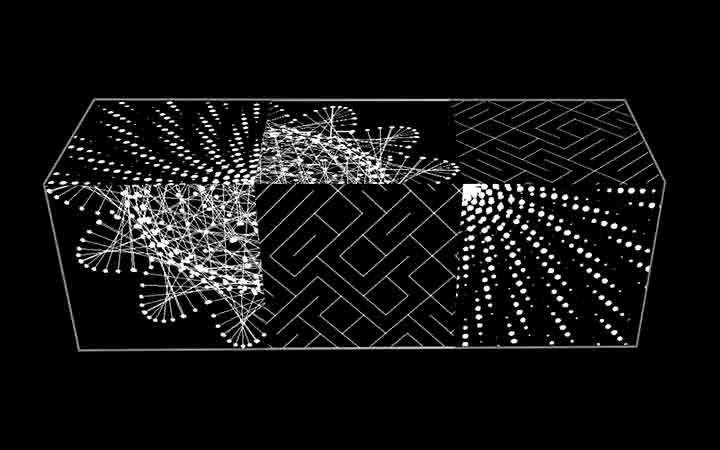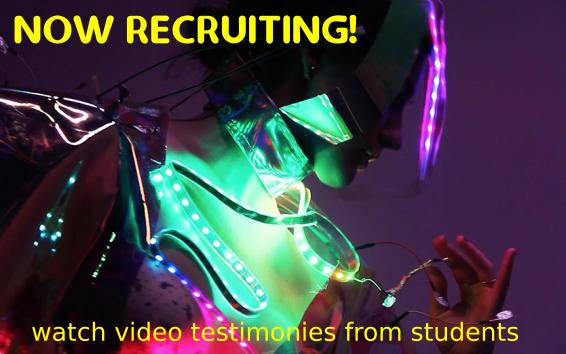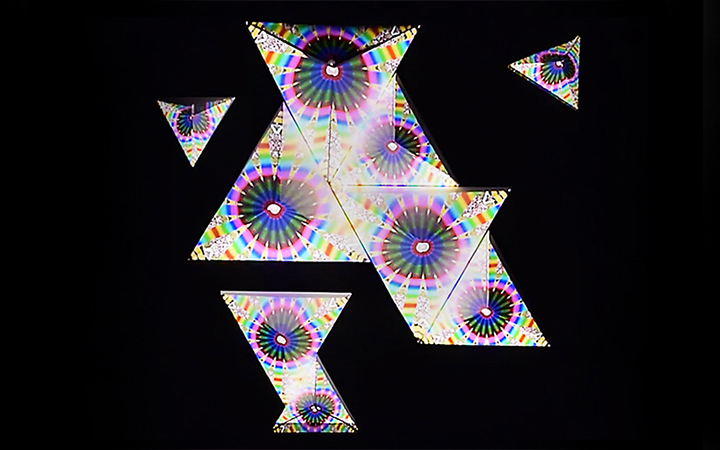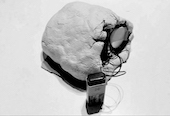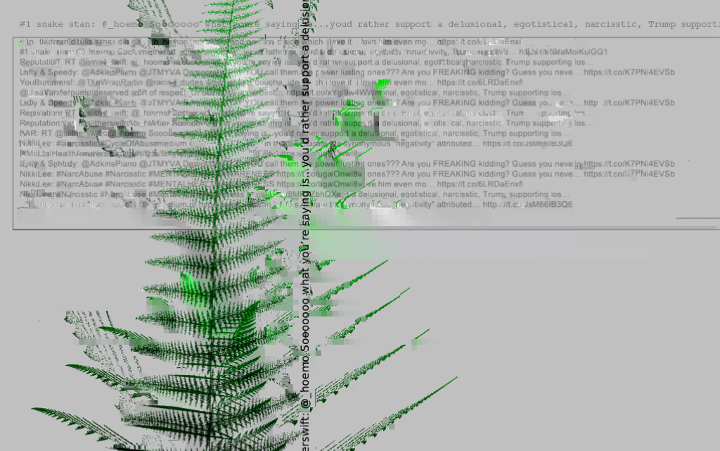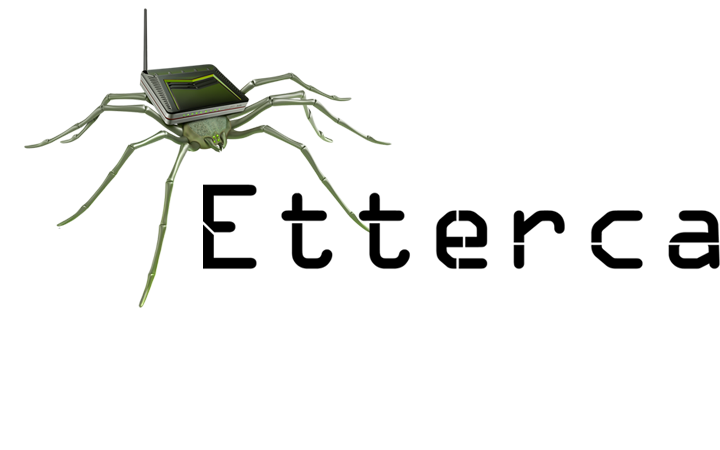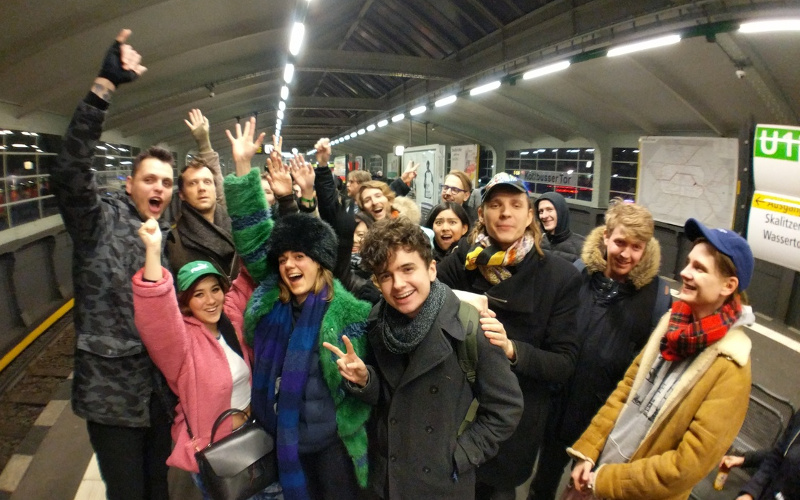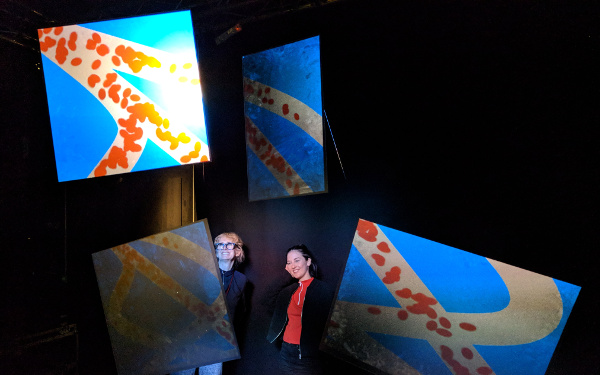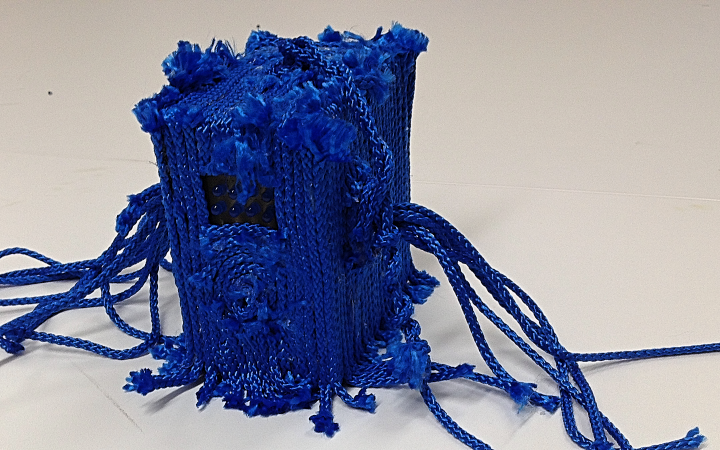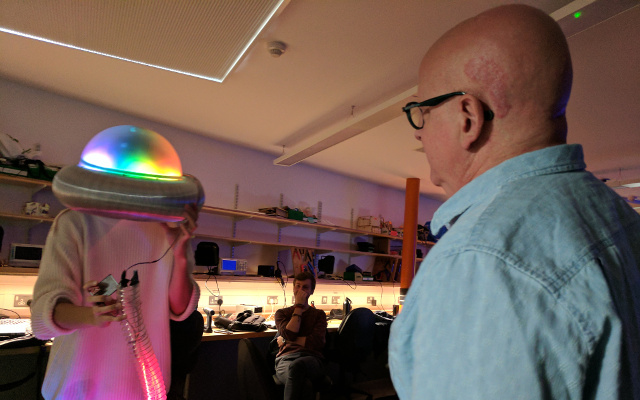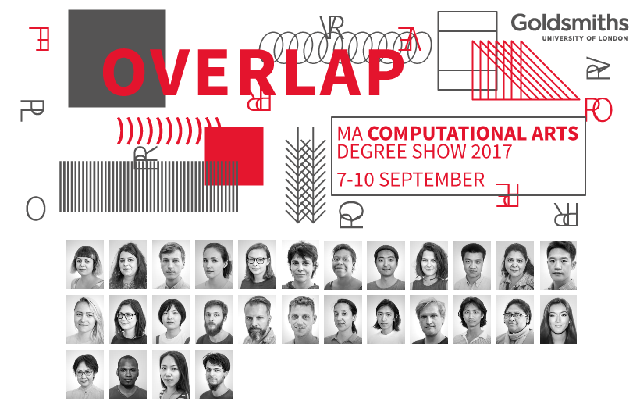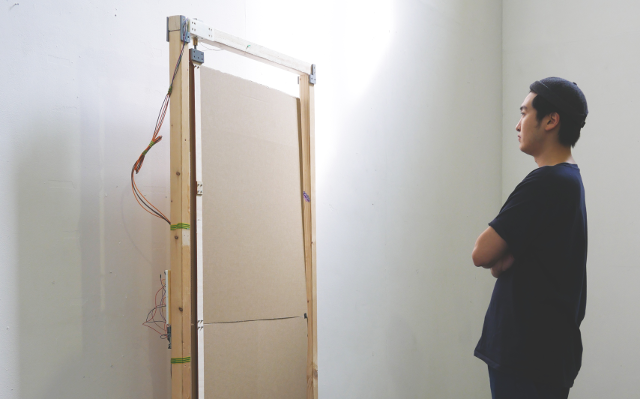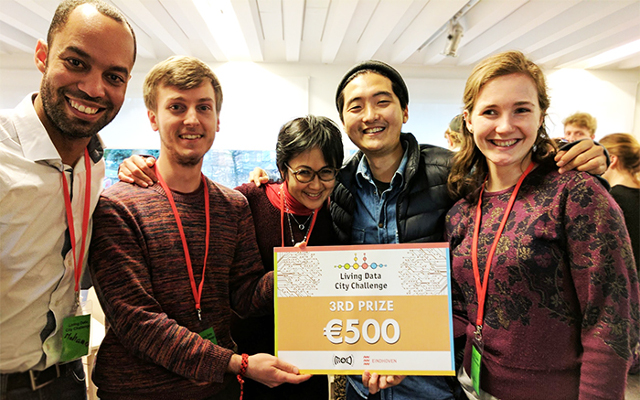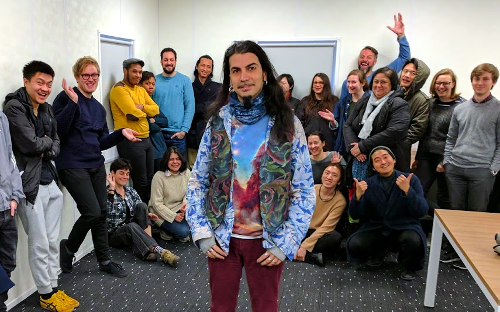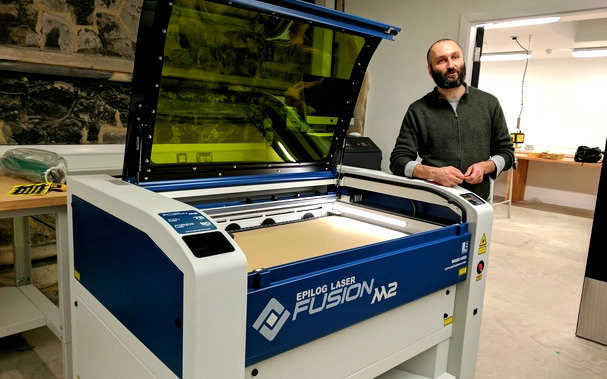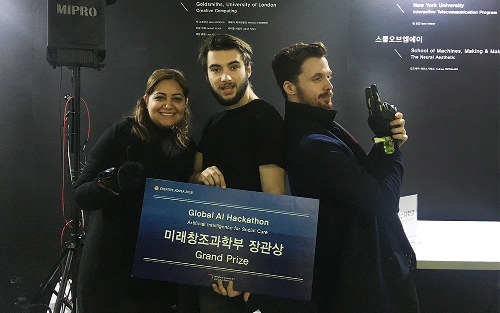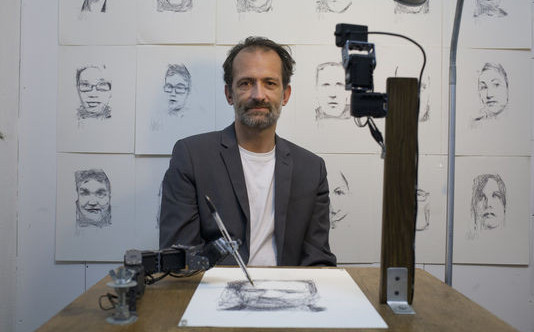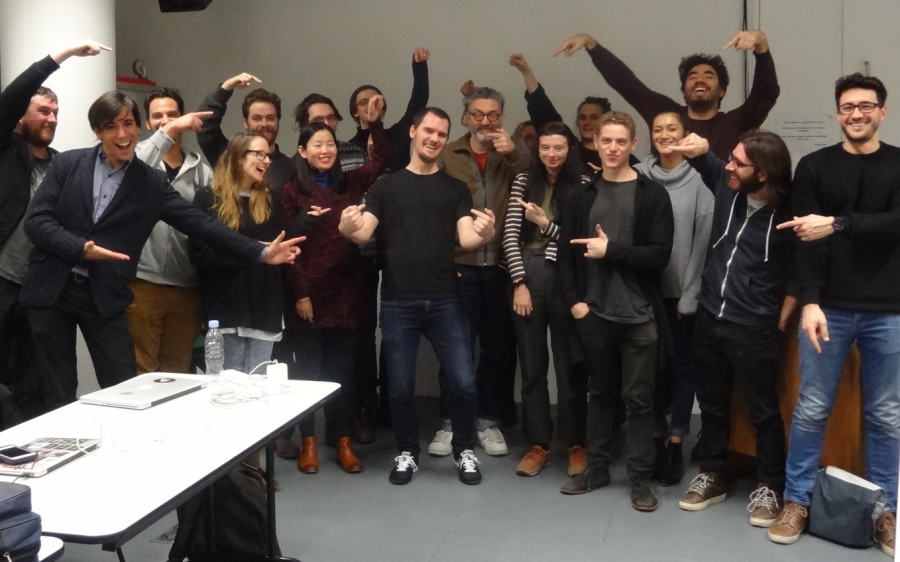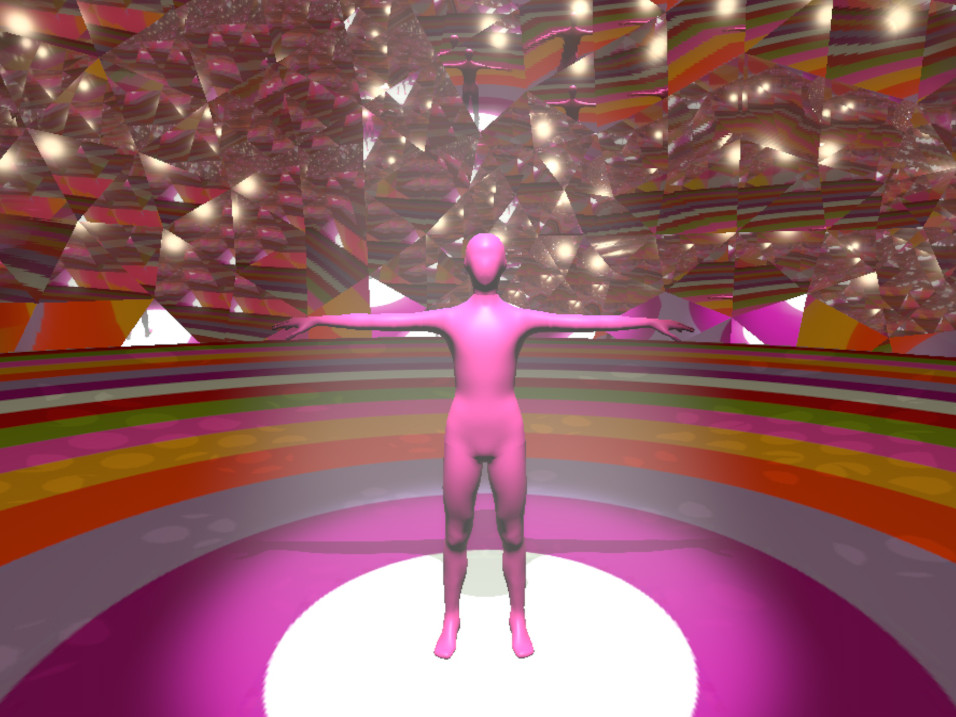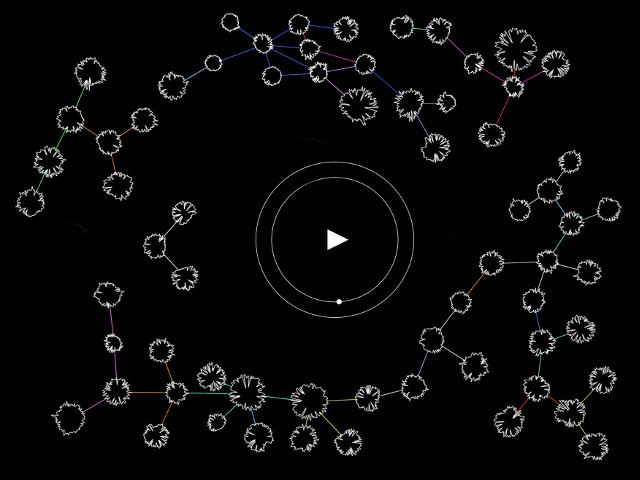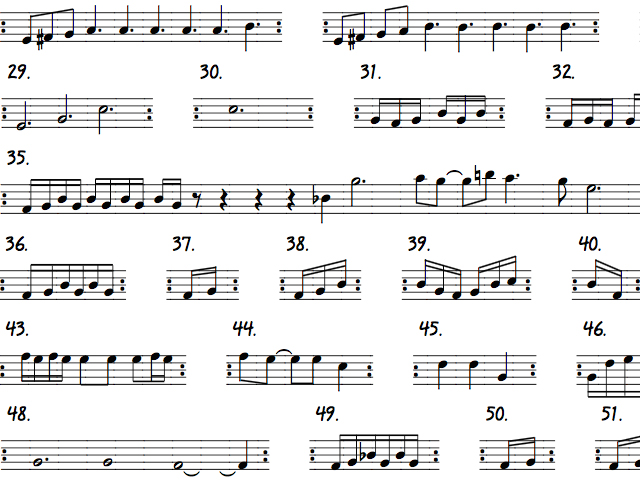The Rise of Retune - A speculative future
Callum Fowler
Abstract
This research project has resulted in a speculative piece of fiction outlying the development of an artificial intelligence being integrated into a popular music streaming service. It is told over a number of decades to show the development of the software, named ReTune. This piece of work was influenced by current posthuman and technologic ethic theorists. The writing also poses the idea of post-musicking. Musicking is a concept by Christopher Small which says that the creation of music is not attributed to one person. It is instead the sum of many moving parts. Music can not exist without the composer, the performer, the audience member, the sound engineer etc. Small states that everyone involved with the process influences the music and makes it a cultural communion. Using this notion of musicking, the text questions whether music can be created outside of human control. Using posthuman and musicking I also explore the idea of monopolising an art form or culture. I look into how an artificial intelligence could achieve this and whether this would be positive or negative to society.
This piece of work was the result of a combination of theory based research, media research, and practical creation. Crucially for this project to work, I gained an understanding of the current ideologies in posthumanism and technology critical theory. I also wanted to draw upon current themes that were happening in todays world. For this piece I looked into the accusations towards Spotify about having “fake artists”. This then lead to questions about what would happen if a distribution service, like Spotify, also produced and owned the rights to the music. It also led to questions surrounding the act of musicking and it it is limited to humans. Small would argue that yes, it is a human activity. Yet I speculate that future technologies could easily assume these roles in the music industry. As I describe in the annotated bibliography, working out the correct language to use (especially in the final sections) proved to be difficult. I aimed to speculate what kind of language would be used based on Braidotti and Benko’s posthuman speculations. This piece of work should be taken as piece of speculative fiction, that raises questions about culture, society, and posthuman-musicking.
Post-musicking: The Rise of ReTune
ReTune is a name that not everyone is aware of, however it has changed, not only the way we consume and create music, but also music’s cultural and societal identity. This article will present a narrative over the development of the ReTune software, from its early inception by Alan Smith to the present day. The first extract is from a presentation by Smith showing off an early version of ReTune from 2020. This is followed by a section of a media article from 2033. Finally I present an extract written by Josephine Taylor outlying a review of ReTune and its impacts on current society. This article aims not to force a bias on to the reader but merely to outline a narrative for the development of this software. Outside of the technology this discussion also hopefully raises questions about culture, history, and agency in our society today.
Alan Smith, Machine Learning and Composition: Compositron, New Tools for Musical Expression (2020) - Presentation
“In the past decade, machine learning (ML), the idea of artificial intelligence and the singularity has been an ever growing field of research in many university departments. Music researchers are no exception to this trend. ML has become the backbone for many different projects, and thanks to Wekinator, and other GUI based software, it is becoming increasingly easier to implement. In this presentation I wish to outline the fundamentals of Compositron, a ML based software I have helped create. Briefly, Compositron takes two audio samples and creates a brand new composition from the data it extracts.”
“Compositron builds on Google magenta’s N-Synth software, as well as having additional support from tensorflow. It is being run, for now, on the university’s servers. We have a setup using multiple NVIDIA GeForce graphics cards which are handling the ML and we have a response time of around 18 hours. At the moment we are limited to generating one minute of audio, but we hope in the coming months we can increase this to three minutes. We also have a two minute limit on the audio that can be put in to the system (a total of four minutes between two samples). While this system is slow, it does yield some interesting results. We have done tests combining industrial-core and country folk music. The results, while quite abstract, were very interesting. The system also retains information it gathers from every “re-composition” and so in time the hope is that it not only becomes more efficient but it also makes clearer and more logical decisions.”
Gregory Tims, Zotify announce ReTune integration, The Merge (2033) - News Article
“Today Zotify have announced they have acquired ReTune, a popular music creation software, and are planning to integrate it into their application. ReTune started becoming well known three years ago, when home machine learning became more apparent. ReTune, originally called Compositron, started as a research experiment lead by Alan Smith. Smith originally ran the project on university servers and hardware. However in the late 2020s the team expanded and in 2029 they released a standalone software package for Mac, PC, and Linux. The software allows users to feed audio tracks into the software and generate new pieces of music, for this reason ReTune was quickly adopted by many musicians and sound designers. Most users have found the software to be incredibly useful, and the online community has fostered a whole music scene that show cases these unique compositions. Now Zotify is aiming to integrate this software into their mobile app, allowing users to quickly mash together two songs and hear the output instantly. The updated app will also allow the users creations to be automatically uploaded to a playlist which they can show on their user profile. Sadly, Zotify has noted that not every feature found in the desktop app will be carried across and we are waiting to see which features will be cut. We also do not know if there will be continued support for the stand alone after the integration has happened. Despite these unknowns we think this integration will provide a great platform for people to experiment with this technology. When the update comes we want to see all your compositions so share them with the #mergedSongs.”
Josephine Taylor, Did we go wrong?: A contextual review of ReTune and the dawn of post-musicking, Donatello (2055)
“At the time of writing, the main question underpinning most musicologist research is whether the integration of ReTune has permanently shifted the music landscape. Many researchers feel that we are starting to enter a world where a single company, in this case Zotify, own the whole commercial music market. They create, distribute, and own the majority of the music on their service. This is the first time in history a single entity has had such monopoly in a cultural market. Many researchers question whether this progression of events was inevitable, and if we are now entering a new era of post-musicking.
Musicking was a termed coined in the late 20th Century by musicologist Christopher Small. Small noted the importance of every person involved in making music possible. This includes, but not limited too, composers, performers, audience, audio engineers etc. The question is can these traditionally human roles be taken over by a technology, and what is the impact of a single technology occupying many roles. In this article I will retell how we as a society have got into this situation, and examine whether we are entering into an era of post-musicking.”
“As artificial intelligence (AI) has developed over the last three decades we have seen monumental shifts in our society. AI takes care of most administrative and media roles in our society, and while we still have many people working in these sectors these jobs are mainly to overview and assess the process. While there are thousands of AI systems, due to the anti-unity act of 2042 prohibiting AI systems from being used across companies, most people only know the main systems. There is one system which was introduced very early on into our societal shift towards AI, this was ReTune which is of great importance to current musicology studies today.
Originally the first commercial use of ReTune was to allow users to create new compositions from pre-existing material. In the early 2030s, Zotify acquired ReTune and allowed users to use this technology within the application. This was my first experience with the software, as it was for many people, and as a young music major this was a very alluring piece of software. The musical applications were limitless. It suddenly became popular with students and composers, who wish to quick sketch out compositional ideas whenever they wanted. It also spawned a new wave of musicians who solely created music using this technique. Zotify became a social media platform where amateur and professional composers could create these generated compositions and share them with the world. Some of whom gained a lot of attention in the new genre, getting millions of streams. This was an amazing time to be a music creator and consumer everyday people were creating new music and sharing it with the world.
However for a while it was unknown to consumers that Zotify owned the rights to all content created using the ReTune software. It also started using these tracks to pad out some of their curated playlists. Since the late 2010s Zotify has been using AI systems to curate their playlists, and suggest playlists to their users. While these early versions were crude compared to todays standards, they quickly created optimal specifications for playlists. The two main factors were playlists that had a lot of songs, and that were also being constantly updated. Once Zotify had the ability and the ownership to generate new material, it made sense to start using these tracks to boost playlists to the optimal level.”
“Zotify started having a major problem in the mid 2040s. Users of ReTune started to die down as the novelty wore off, but 60% of their playlists relied on ReTune material and the practice had become a key part of the business model. At its peak the amount of users creating new material using the software reached about 15%, however in late 2044 that group had shrunk to 0.04%. This meant that there was not enough new material generated to fulfil the playlist AI requirements. To compensate, in early 2046 Zotify released an update which allowed them to track what users are listening to and run those pieces of music through the ReTune system. This was not done in secrecy, in fact the company advertised it as a USP. ‘Music made by you, for you’, slogans like these can be found on many Zotify adverts from the time. This was a real turning point for not only the company but for the commercial music industry.
In the years following more and more people passively listened to these generated pieces of music as they appeared more frequently in playlists. A cycle began to occur of people listening to generated music which in turn generates new music that gets pumped into Zotify’s most popular playlists. It is now estimated that 70% of music on the system has been the product of ReTune and the company is now the single biggest music entity to have ever existed. It is no longer just a distribution service, but it is also the most prolific composer, and audio engineer. All this means that Zotify is no longer a company but a cultural entity, one that has many listeners and even fans. The company has also said they are developing a live version of the software which creates a DJ set based on the top tracks at any given time. This prompts further questions about Zotify’s role as a performer, but I will leave that discussion for a later date. Zotify has now started assuming many different roles in the music industry.
This monopolisation of the commercial music industry is mainly attributed to ReTune becoming a transparent technology. It was in the background of day to day life and society did not need to bother itself with the software’s actions. Moreover it was constantly being engaged with. By the late 2040s over 85% of people used Zotify daily, meaning data was constantly fed into the self replicating system. Generally transparent AI are perceived to be beneficial for society. For example the medicare-bots which are consumed daily and are used to detect a number of illnesses before a doctor could. Currently it is estimated that 96% of the population take the medicare daily pill. It has now become the social norm, however changes like these have only been accepted in the past two decades.
ReTune’s transparency allows it to have one of its greatest features, its ability to encapsulate the musical expression of a global population. Stepping into Zotify’s playlists, which have in recent years dropped the genre-based labels, can be like stepping into the most popular music. Despite an algorithm creating it, it is the outcome of millions of hours of listening done by people. The AI’s capabilities mean that it is able to create some of the finest pieces of music, and as these tracks become popular they reinforce certain musical trends. Inevitably this means that the software will start creating perfectly accurate pop music, that the masses will love. This however does lead to, from a cultural stand point, the systems biggest flaw. Soon we are likely to see musical entropy. This term came up last year in a number of academic journals. It is the idea that the ReTune system highlights and reinforces popular music trends so the system will end up returning similar sound tracks again and again. This impact of this is exponential and we are already starting to see it become apparent in some of the playlists. Most notably is the change in song duration. More than 64% of generated songs have, on average, a two minute run time. This is becoming more precise ever so slowly, but this musical evolution is happening. This is not happening because of a music scene or a band taking over the world but because an algorithm is evolving music based on our choices."
“This evolutional shift can be described as post-human-musicking or post-musicking. Zotify’s system is now fulfilling multiple roles in music that musicking describes. This goes against one of the key ideas of musicking, that it is focused on peoples contributions to music. The AI is now a key player in the commercial music industry and assumes many roles all at once, this cannot be ignored. Instead we need to start thinking about the bigger questions surrounding culture and creation. For thousands of years the ability to create artefacts had been a key aspect of people existence. While many other animals create, no other flora or fauna has been able to establish multiple creative outlets which form a culture. These are inherently person qualities which defined us as a species. Now, technology is becoming more and more powerful and is starting to catch up with our ability to create and establish a culture. In our current society we have not lost traditional musicking, many people still create and perform music. However I believe that we will start to see these types of systems becoming ever more present and entwined in our global culture. I also believe that this is not limited to music, and will eventually spill into art, film, and media. However this is not something to be feared, there are things that AI can do that no human could. For example this is the first time ever we are able to represent our global culture through music that we have all contributed towards. This is an incredible resource for digital ethnographers and musicologists, who are already working on documenting and archiving all of these pieces of music. These types of systems have many advantages but also some disadvantages. Moving forward I believe we should not take a back seat. We should start looking, as a global community, at how we can integrate these AIs to be a part of our culture, and strive towards a global culture that all entities can contribute towards.”
Annotated Bibliography
Benko, Steven, “Ethics, Technology, and Posthuman Communities”, Essays in Philosophy
This article by Steven Benko outlines both a technophobic and a technophilic view of posthumanism. He refers to two philosophers Fukuyama (technophobic) and Clark (technophilic). Both discuss the societal impacts posthuman activities could have. Fukuyama talks about how body augmentation would lead to segregation and division. This societal divide would foster anger between those who have/are able to have the physical modifications and those who do not/can not. He is worried that this would lead to a collapse in society. Clark has a much more positive view, and talks about how systems can help cure diseases and lengthen life. However he notes that this may cause societal tension that would have to be over come. A main difference between Fukuyama and Clark is that Fukuyama refers to a visible technology whereas Clark envisions a transparent technology. Clark argues that a transparent technology is the only way these posthuman ideas can manifest themselves in society, as any type of visible technology will create too much distress. This article provides a concise view of the two different trains of thought that are present in current posthuman writings.
Braidotti, Rosi, “Posthuman Critical Theory”, Critical Posthumanism and Planetary Futures, Springer India (2016)
Rosi Braidotti is one of the main writers in the topic of posthumanism. This text covers her main views surrounding this complex topic. She sees as posthumanism as a chance for current society to adopt inclusive cultural and linguistic concepts. Talking about artificial intelligence and speculative futures mean these theories and discussions should be taken into account. I have tried to bring these concepts into my writing. Notably in the final section I have omitted “human” where best I could. Braidotti specifically calls out “human” as a term which is exclusive and so should begin to be phased out. Not to ignore our global humanity but to include all entities and build upon humanistic qualities. In my writing I have envisioned that a society that has progressed to the stage where human level AI is apparent that exclusive language has been phased out.
Deahl, Dani and Micah Singleton, “What’s really going on with Spotify’s fake artist controversy”, The Verge (2017)
This news article is what inspired the idea of a streaming service having a monopoly in the music industry. For a couple of years, allegations against Spotify came to public attention as media outlets accused the company of filling their playlists with “fake artists”. While these allegations were proven to be untrue, it does offer an interesting concepts where media outlets own the rights to the product they sell. Spotify has already had a huge impact on the music industry and music consumption has made a permanent shift to streaming. It is also feasible that Spotify may want to become what MySpace was in the early 2000s, a music focused social media. While this article does prove that Spotify owns no rights to any music, it is possible that in the future Spotify may start a label, or start acquiring rights. Making sure music does not become monopolised is important to me, and this article as well as my writing highlights the issues that could occur if it does happen.
Small, Christopher, Musicking: the meanings of performing and listening, Wesleyan University Press (1998)
Small’s concept of musicking is the backbone of this speculative writing. The simplest definition of musicking is: the impact people have on the creation of music, in all aspects. It includes performers, composers, engineers, but also the audience, event planners, chaperones and many more. The extent to what musicking covers is limitless, as even venue cleaners could fall under the term. Musicking is a crucial concept to include in any post-human assessment of music. As described in the writing, both music and musicking require human intervention but what happens when a technology can fulfil these role? In the writing, humans are still required to act as judge and what features should be carried over. This is not a role present in Small’s musicking but critic and judge could be inscripted into a post-human version of musicking.




